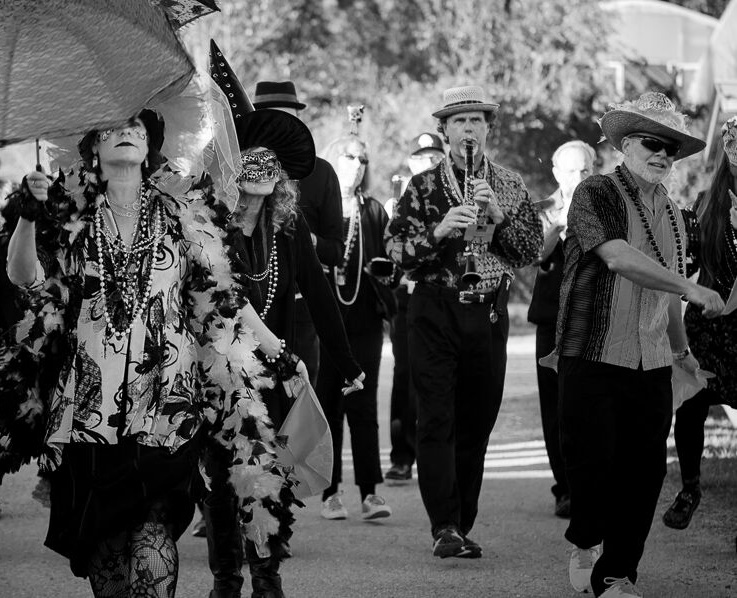
I talk with the corpse as I set up the PA system. When asked to lead my brass band for a New Orleans-style jazz funeral, I expect to stir up the depths and heights of human emotion through music, but never to consult with the deceased. This year’s Death Faire, an annual educational event in Pittsboro, North Carolina, culminates in a mock funeral held in a green burial ground with a living person wrapped in a burial shroud with handles.
After testing the microphones, I join my band back at the cemetery entrance. We play “Just a Closer Walk with Thee” and “Wade in the Water,” somber and somewhat slow, but not without a jazzy swing. Our vocalist sings “Down by the Riverside,” the chorus prompting a singalong: “Ain’t gonna study war no more.” As the pallbearers approach, I see the sag of the person in the shroud and wonder how they can breathe. Our drummers begin the dead march, a drum cadence drilled into my brain watching the televised funeral of my first hero, John F. Kennedy, in 1963. The rhythm is simple and repetitive, with just enough silence for listeners to insert their own thoughts of mortality. Reading the stage direction “Dead March” in Shakespeare, I hear this rhythm.
The corpse and those serving as family of the deceased pass by as the horns begin a dirge. Leading the mourners into the cemetery, some of the band falls into the slow and sideways step-pause-step that you see in New Orleans behind a horse-drawn hearse. When we end our dirge, the silence of the golden autumn woods embraces us around the grave.
The Death Faire organizers welcome us, explain this gathering, and introduce the ritualist, a death doula of Choctaw heritage. Beginning with the East, we turn to invoke the powers of each cardinal direction. Returning to Center, we feel connected to this land and to our ancestors. As he speaks about death in our culture, he gets a cell phone call, and we are shocked that he answers. His face registers sadness as he ends the call with “Okay, I’ll tell them.” He informs us that God has ended all of our lives at that moment. I can feel the energy in our circle turn to lead. We are all the corpse in the center of our circle, all on the hook.
Our leader asks if we “died clean” or if we have regrets. He and a co-facilitator then alternate asking dozens of probing questions, a life review. Did you love well and often? Did you right your wrongs? Did you leave a will and end-of-life directive? I consider what I can check off and what remains incomplete for ten disconcerting minutes that seem much longer. The phone rings again. His face brightens as he tells us our deaths are rescinded — we have more time amongst the living. We pledge to do our best to die clean.
On his cue, I slowly begin “I’ll Fly Away” on clarinet in the low register, without other instruments, free to stretch notes for emotional impact. Then Charlie, our eighty-four-year-old singer, enters: “Some bright morning, when this life is over, I’ll fly away.” Band members add poignant acapella harmony. “To that home on God’s celestial shore, I’ll fly away.” After two verses, we stop and I count us off fast, moving from sadness to joy in one downbeat. Smiles and bright eyes around the circle signal relief at rejoining the ranks of the living.
When the ritual ends, we parade them away from the grave with “When the Saints Go Marching In.” Parasols bop, a few hankies wave, and dance moves erupt as we strut back down the path to where we began. Our last note brings cheers, and shouts for more. We play them down the driveway in a spontaneous second line towards a big pot of gumbo. Ah, the Bulltown Strutters sure enjoy our privilege of representing the jazz brass band tradition of New Orleans here in North Carolina.
Back at the grave to break down the PA, I find the corpse there, unwrapped from the shroud. I ask about their experience. They were able to remain calm, breathe through the fabric and only come away with a sore back. Lying face up on the ground, the vibrations of the music enveloped them like the shroud, lifting them up even as they felt part of the earth. The corpse’s final words: “I would do it again next year, but with a knee pillow.”